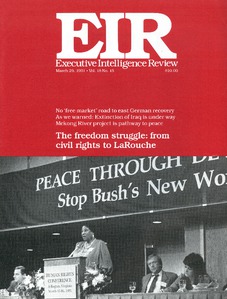Interviews
Faisel Husseini
by Joseph Brewda
The leader of the Palestinian delegation that met with Secretary of State James Baker reports on their meeting, and on post-Gulf War prospects in the Occupied Territories.
Palestinian Leaders in the Occupied Territories
by Hanna Siniora
Al-Fajr editor Hanna Siniora interviewed mayors, attorneys, journalists, and fellow editors on what Palestinians think about the “new world order,” and provided their responses to EIR.
Dr. Robert J. Lifton
by Kathleen Klenetsky
A professor of psychiatry at City University of New York, Dr. Lifton foresees that a wave of revulsion will set in after Americans learned what slaughter was committed in the war.
Departments
Andean Report
by Carlos Méndez
Washington’s man in Lima.
Dateline Mexico
by Carlos Méndez
Church Fights Abortion.
Report from Rio
by Silvia Palacios
Anti-Military Campaign Escalates.
Panama Report
by Carlos Wesley
Congress Debates Impeachment.
Dateline Montreal
by Gilles Gervais
Mulroney and Bush Fail Acid Test.
Editorial
Emergency Relief for Iraq Now.
Strategic Studies
Beijing Hosts Superpower Huddle on Cambodia
by Linda de Hoyos
The August 1990 U.N. peace efforts haven’t gone beyond negotiating seating arrangements, as fighting continues in 14 of the 19 provinces of this country, now entering its 21st year of war. Everyone wants to keep his oar in, and some even have the interests of Cambodia in mind.
Mekong Project Is the Pathway to Peace
by Linda de Hoyos
Last year, Thailand revived a multinational project to harness the Mekong River for electricity, transportation, and agriculture, as the basis for bringing peace to the region, and especially to Cambodia.
Mekong Development Plan: It Is Time To Awaken the ‘Sleeping Giant’
by Uwe Henke v. Parpart
In startling contrast to the abject poverty of the 50 million Thais, Laotians, Cambodians, and Vietnamese, the Mekong basin’s water resource potential is unquestionably among the world’s highest.
Book Review
Lebanon: Who Is ‘Biting’ Whom?
by Susan Welsh
Pity the Nation: The Abduction of Lebanon, by Robert Fisk.
Economics
No ‘Free Market’ Road to East German Recovery
by Rainer Apel
The workers who said no to Marx in 1989, are again in the streets, this time saying no to the Adam Smith policies that threaten them with 50% unemployment.
Currency Rates
Peru Minister Blames Fujimori for Cholera
by Valerie Rush
In fact, the President’s policy of neglect is dictated by the country’s foreign creditors, who explain, “Certain countries are going to disappear.”
Agriculture
by Marcia Merry
Sudan Calls for Food Aid.
Banking
by John Hoefle
Failing Banks and Bushspeak.
Business Briefs
Feature
U.S. Civil Rights Struggle: A Crucial Lesson for Today
by Carol White
One fighter for humanity who has maintained a constant outlook of cultural optimism in 60 years of organizing is Amelia Boynton Robinson. From Selma, Alabama in 1930 to East Germany in 1990, she has personified the struggle of all men to be free, to be brothers. We are proud to excerpt the forthcoming second edition of her book Bridge Across Jordan.
Anglo-Americans Drive To Kill, Dismember Iraq
by Joseph Brewda
Phase two of the war has begun, with the implementation of Iraq’s extinction by civil war, famine, and disease.
Gorbachov, Yeltsin ‘Win’ in Soviet Referendum—Now What?
by Konstantin George
Odd Bedfellows Act To Avoid Civil War
by Konstantin George
The Yugoslav Army is publicly refusing to back Serbian strongman Slobodan Milosevic’s bid for a coup.
Palestinians Meet with John Paul II
by Umberto Pascali
El Salvador: Superpowers Decree FMLN the Winner
by Gretchen Small
Washington Hurls New Insults at Japan
by Jeffrey Steinberg
Birmingham Six Case Shocks Britain; Some See Parallels to U.S. ‘Justice’
English Lawyer Writes to Thornburgh on LaRouche
Pope Sees ‘Echo of Grace’ in Mozart as Example of True Meaning of Joy
by Pope John Paul II
John Paul II’s speech to the Plenary Assembly of the Pontifical Council for Dialogue with Non-Believers.
International Intelligence
National
Bush’s New Export Controls: Third World, U.S. To Suffer
by Kathleen Klenetsky
Technologies that provide your daily bread, and industrial jobs, will now be controlled.
Activists Say: Free LaRouche, Stop the ‘New World Order’
by Paul Gallagher
Close to 500 participants laid out a spring offensive to free the only presidential candidate opposing George Bush, including the first discussion of LaRouche’s legal motion for a new trial.
George Bush and the Emperor Augustus
by Warren J. Hamerman
Many People Are Not Happy about This War
by Kathleen Klenetsky
Interview with Dr. Robert J. Lifton.
Bush Claims ‘Victory’ in Phony War on Drugs
by Jeffrey Steinberg
Between “Just Cause” and “Desert Storm,” the President’s war on drugs is “Gone with the Wind.”
Urban Leaders ‘Storm’ Bush Domestic Policy
by H. Graham Lowry
Young women in New York City have a greater chance of dying from AIDS than any other single cause.
Inslaw Scandal Still Haunts Thornburgh
by Jeffrey Steinberg
Congressional Closeup
by William Jones
National News
Corrections
In our March 22 Feature, two errors have been pointed out. It was Jerusalem Patriarch Michel Sabbah who led the Palestinian ecumenical delegation to the Pope on March 14, not Genes Saed Khoury, as reported on page 31. Due to a typographical error, Prof. Mousa Darwish of the University of Bethlehem was quoted saying, “We Palestinians consider Jerusalem as the capital of our state.” He actually said “East Jerusalem” (page 41).



